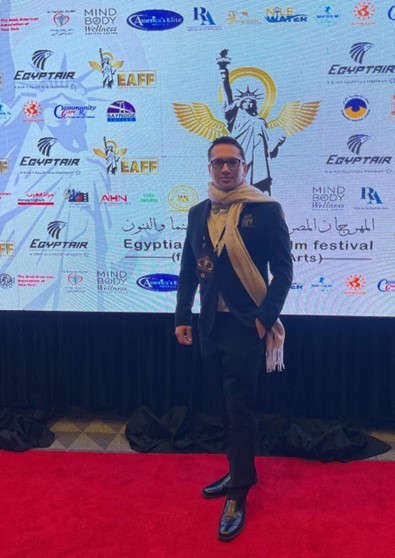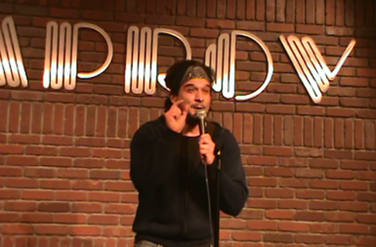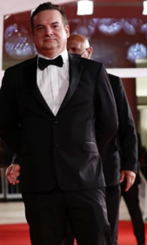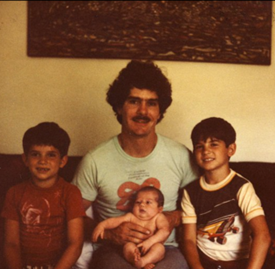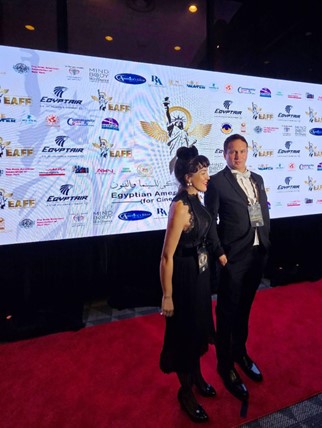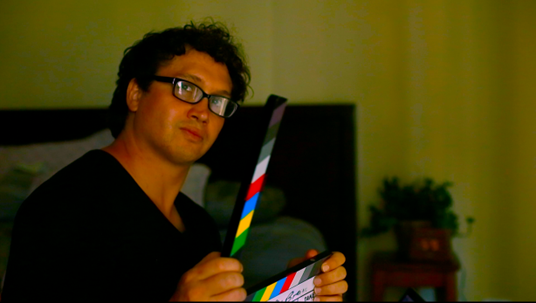The vibrant atmosphere of New York City recently hosted a prestigious gathering for film enthusiasts—the Egyptian American Film Festival. This year’s edition highlighted an experimental filmmaker whose work not only won accolades at festivals, but attempted to capture how love can move humans. Fraser Kershaw weaved elements of the artform “Live Cinema’” in his latest film, a project previously developed in close collaboration with Francis Ford Coppola.
Q&A with Director Fraser Kershaw
Q: Can you share what it felt like to have your film recognized at Film Festivals?
A: It’s an exhilarating experience. Festivals are crucial to attend. Especially when in NYC it provides the perfect blend of the world culture. The Egyptian American Film Festival provided a platform where it allowed me to throw a new level of experimentation into the abyss. When large feelings are catapulted up on the huge wall, for all is what it’s all about, community. Festivals allow the essence to be squeezed out into the open. It’s a must!
Q: What insights do you have for aspiring college filmmakers about the festival circuit?
A: “We’re never truly ready to shoot—it’s as if time rarely gives us the freedom to create with complete openness. That’s why we must close our human eyes and take the first step in absolute faith, trusting the vision within us. It’s about pushing through the noise and overcoming life’s preconceptions to capture the essence, like when we see the hummingbird, you only have a few seconds, so go! Filmmaking seems to be a battle, both internal and external, with countless moving parts.
Film festivals are far more than glamorous showcases or opportunities to say, ‘Look what I did.’ They’re dynamic marketplaces where the future of a classic cinema can be shaped, as distributors often scout for their next film. These events are also spaces to authentically express yourself. The effort is worthwhile because festivals provide invaluable feedback.
Every experiment requires feedback to grow, and filmmaking is no exception. It’s through this process that we transcend, and the potential for transformation at these events is truly extraordinary.”
Q: How do the festival screenings differ from other releases?
A: The “festival cut” often differs significantly from the version audiences eventually see in theaters or online. Festivals provide a vital opportunity to assess reactions and refine the film for wider release. This process adds an exciting dynamic—it’s like experiencing a new version of the movie with each festival. The real-time feedback from festival directors and audiences can play a pivotal role in shaping and enhancing the final product.
Q: Could you describe the role of film festival juries from your perspective?
A: It’s a mystery to me how they do it. The dedication of festival directors and jurors is truly remarkable—they’re the ultimate cinephiles, watching films from dawn until midnight with unwavering focus and genuine passion. They endure marathon viewing sessions, meticulously evaluating countless films with precision and care. It’s an incredibly demanding task, yet their discerning eyes bring immense value, shaping the festival’s spirit and offering invaluable guidance to all of us.
Q: How do smaller, regional and international festivals compare in terms of impact?
A: Every film festival offers its own distinct atmosphere, and I have had the honor of being invited to 16 thus far, spanning countries from France to India and beyond. Many attendees find themselves without an interpreter for the opening ceremonies, but when the lights dim, the universal language of cinema unites us all. The term “Film Society” could aptly describe many of the smaller, more intimate festivals. These regional gatherings are invaluable for fostering meaningful conversations and building early momentum for creative works.
Engaging with audiences in real-time offers a unique and immediate appeal—it provides direct feedback and can open doors to exciting distribution opportunities. The circuit also provides a wealth of inspiration through the diverse countries and cultures it showcases. Personally, I am particularly eager to attend a festival in Italy. After the event, I plan to spend extended hours at an ancient theater, walking along its stage and absorbing the rich history it embodies.
Kershaw emphasizes the importance of tapping into history and recognizing that, despite the challenges life brings, love and freedom of expression have persisted and continue to shape the artistic landscape today.
Reflecting on Artistic Motivation from Gubbio, Italy
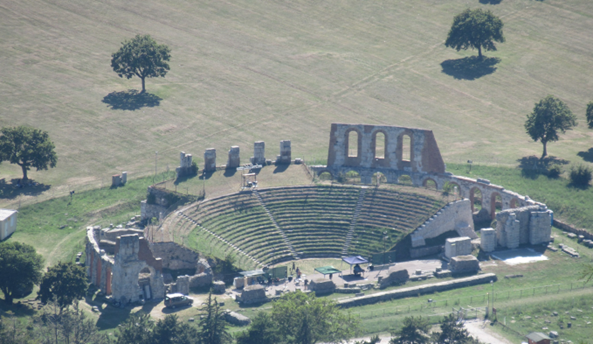
The familial ties run deep for Kershaw, stretching all the way to Gubbio, Italy—a place where creativity once thrived in vibrant open-air markets, celebrating artistry long before it was widely embraced. These geographical selections from film festivals are not just a personal achievement, but a chance to revisit a rich family tradition steeped in artistic expression. Influenced by family members like his brothers, Stanley Preschutti, a Hollywood producer, and Eliot Preschutti, a Hollywood comedian and scriptwriter.
Kershaw carries forward a legacy of creativity and performance from his big family. This family inspiration traces back to his father, an in-house artist who heavily experimented with 16mm film, painting, sculpture, and landscape art, tirelessly exploring new mediums with us all.
So, when festivals ask about the synopsis, it can get tricky. As I feel like it is almost as important as the film itself as that is how they market your film for the audience to come witness their event. My recommendation is as honest in how it makes you feel. Here is mine:
“Love weaves through the heart of an American college town, unfolding between two souls as it drifts through various places- Across generations, love shifts and evolves. Journey into the unseen realms where beginnings and endings meet, and forever reveals itself in a mental odyssey beyond the limits of perception. From the first spark to the final whisper, love transcends into eternity, even beneath the tree standing quietly at the center of everything.”
“Our first family film was called Dumpster Boys,” Kershaw recalled. “My dad shot it on his 16mm, and we kids played the gang of bandits living inside the dumpster and perhaps that may have sparked everything to bloom into today.”This cultural and creative heritage is further enriched by Kershaw’s cousin, Erica Fabri, whose performance poetry—particularly her love poems—has found its way into his cinematic storytelling, including, The Summer of Love, where she plays the female voice.
Kershaw shared, “Cousin Erica strategically melted her poetic monologue into the character’s feelings, and the result was, somehow, buon appetito.” Through this blend of influences and a fearless commitment to artistic experimentation, Kershaw underscores the importance of embracing failure. “Failure is essential,” he asserts. “Both students and professionals are the same in a sense—we both need to fail, as we’re all constantly learning. It’s through failure that we discover what works.”
Kershaw also highlights the subliminal footage of two characters in his film, who happen to be close friends of his for many years. Both are married professional painters who experiment with mixed media to explore their love as a couple: Justin Gruneberg and Laura Mustio.
Reflecting on the creative process, Kershaw said, “I had an idea of where it might go before Justin and I began to film a few special life moments because he found the big green tree, and everything came together from there.”
Kershaw’s journey to the Egyptian American Film Festival stands as a beacon of creating with family and friends in the name of artistic collaboration, honoring the creative roots that continue to shape his work. “We are forever a family of students in this process,” he said, “always learning and never truly mastering anything completely, because moving images are constantly evolving. Students should use what’s around them to bring their vision to life now—whether in class, with mentors, professors, or peers—while drawing courage from the rich history that surrounds them.”
For Aspiring Student Filmmakers
- Stay True to Your Vision: While feedback is important, never lose sight of your unique voice and vision. Let your individual style guide your projects. Don’t let others undermine your creativity—if you feel strongly about an idea, pursue it with confidence.
- Persevere Through Challenges: Filmmaking is a demanding and often expensive journey. Persistence and dedication are essential. Every setback offers an opportunity to learn and grow. Face each day with determination and keep pushing your creative boundaries.
- Embrace the Leap of Faith: “We will never be fully ready to shoot,” Kershaw admits, advocating for a leap of faith. He urges aspiring filmmakers to move past self-doubt and embrace the creative process with unwavering belief. Time waits for no one.
Festival Circuit Tips and Tricks
- Festivals: More Than Just Showcases: Kershaw describes festivals as exciting and collaborative spaces. The “festival cut” is a crucial stage, offering an opportunity to gather audience feedback and make necessary adjustments.
- The Power of Real-Time Feedback: He emphasizes the immense value of engaging with audiences at festivals. These interactions provide filmmakers with direct, actionable feedback to refine their work.
- The Jury’s Perspective: Kershaw provides an insider’s look at the dedication of festival juries, describing them as passionate cinephiles who undertake marathon viewing sessions to offer insightful and valuable guidance. Enjoy the journey—and the food!
A Family Forged
Kershaw’s artistic journey is deeply intertwined with his family and friends. His brothers, Stanley (a Hollywood producer) and Eliot (a screenwriter and comedian), contribute to a rich legacy of creativity. His father’s experimental work in film, painting, sculpture, and landscape art further shaped his artistic foundation. Adding another layer of inspiration is his cousin, Erica Fabri, a New York City performance poet, whose work resonates deeply in Kershaw’s cinematic world.
His love for landmarks of human history like the grand open-air theater in Gubbio, where public artistry flourished centuries ago, serve as a fitting metaphor for the collaborative and dynamic nature of filmmaking for him. Kershaw’s collaboration with Francis Ford Coppola on the innovative concept of “live cinema” in rural Oklahoma marked a significant milestone in his career which transcends today. His latest project, The Summer of Love, is set to release in 2025.
A Call to Continue for Aspiring Filmmakers
Kershaw leaves aspiring filmmakers with a powerful message: Embrace the culture around you, cultivate relationships with those who create, stay open to feedback, and persevere through challenges. Every setback is a lesson, every festival an opportunity to learn and grow. This unknown journey we strive to create exemplifies the spirit of artistic exploration, reminding aspiring filmmakers to stay true to their unique voice and continue pushing their creative boundaries. The festival circuit is not just a pathway to success, but a crossroads where vision is etched onto the big screen and honed. Experimental cinema is alive and wide open for new techniques to emerge into new unseen territories. The world festival circuit awaits your vision.

